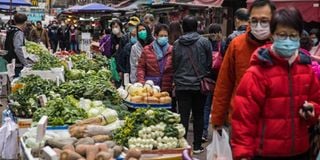China aims to phase out slaughter and sale of live poultry

What you need to know:
- The announcement came as China stepped up inspections of wholesale food markets and outlawed the sale and consumption of wildlife, after a recent COVID-19 outbreak in Beijing was traced to a major agricultural wholesale market.
- Live poultry kept in cages is a common sight in agricultural wholesale food markets and "wet markets" -- smaller-scale fresh food markets -- across China.
Beijing,
China on Friday vowed to gradually phase out the slaughter and sale of live poultry at food markets, in a move welcomed by animal rights activists amid the coronavirus pandemic.
The announcement came as China stepped up inspections of wholesale food markets and outlawed the sale and consumption of wildlife, after a recent Covid-19 outbreak in Beijing was traced to a major agricultural wholesale market.
The virus is believed to have emerged at a market that sold live animals in the central city of Wuhan late last year.
"China will restrict the trading and slaughter of live poultry, encourage the mass slaughter of live poultry in places with certain conditions, and gradually close live poultry markets," said Chen Xu, an official at the State Administration of Market Regulation, at a press briefing.
COMMON SIGHT
Live poultry kept in cages is a common sight in agricultural wholesale food markets and "wet markets" -- smaller-scale fresh food markets -- across China.
The poultry is traditionally butchered on the spot by stallholders, or buyers can opt to slaughter the live animal at home.
Some Chinese people traditionally believe that this allows for maximum freshness. Live seafood, amphibians and other creatures are also commonly sold at wet markets.
Scientists believe the pathogen originated in bats before jumping to humans through a yet-unknown animal intermediary.
Chen urged local governments across China to "strengthen supervision of food safety at agricultural wholesale markets" and "investigate hidden safety risks", taking the Beijing Xinfadi market virus hotspot as an example.
"It is understood that more than 70 percent of meat, poultry, seafood, fruit and vegetables enter the market through wholesale agricultural markets," he said.
ANIMAL RIGHTS
The announcement was welcomed by animal rights groups.
"We are happy to see that live-poultry markets are on their way out in China," said Jason Baker, senior vice president of PETA Asia.
"PETA hopes the State Administration of Market Supervision and Administration continues to stretch their wings and ban all live-animal markets nationwide."





